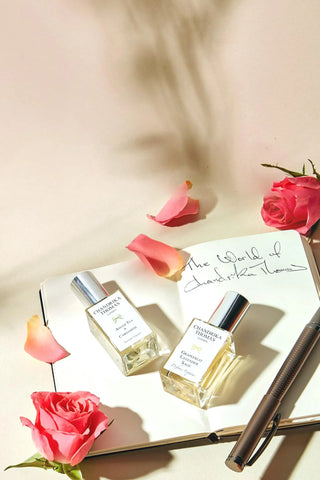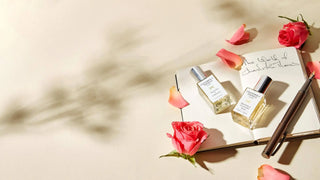A beautifully crafted perfume is an experience, a memory in a bottle. But if you've ever rediscovered a forgotten fragrance and noticed it smells different, you might wonder: does perfume expire?
While perfumes don’t have an exact expiration date, they do change over time. Some scents mellow and develop new dimensions, while others lose their vibrancy or take on an unusual scent. How long a fragrance lasts depends on its composition, how it's stored, and the ingredients used. Let’s explore what affects a perfume’s longevity, how to recognise when it has changed, and the best ways to keep your favourite scents in perfect condition.

Do Perfumes Really Expire?
The short answer is yes, but not in the way you might expect. Unlike milk that spoils or makeup that becomes unsafe, perfume doesn’t "go bad" in a harmful sense. Instead, it undergoes oxidation and chemical changes that can alter its scent profile.
Over time, exposure to oxygen, heat, and light can break down the fragrance molecules, dulling their vibrancy or shifting the composition entirely. A once-bright citrus scent might turn sour, or a warm vanilla note could take on an unpleasant sharpness. While some perfumes may still be wearable after many years, they might not smell as intended by the perfumer.

How Long Do Different Fragrance Types Last?
The aging process of a perfume depends on its composition, particularly the concentration of fragrance oils. Higher concentrations tend to result in longer-lasting perfumes:
-
Parfum (Extrait de Parfum) – This is the most concentrated form, with 20-30% fragrance oils. If kept in ideal conditions, it can last up to a decade or longer.
-
Eau de Parfum (EDP) – With a concentration of 15-20%, these fragrances typically remain stable for 5-8 years before any noticeable changes in scent.
-
Eau de Toilette (EDT) – Containing 5-15% fragrance oils, EDTs are lighter in strength and tend to last 3-5 years before they begin to fade.
-
Eau de Cologne (EDC) – With just 2-5% fragrance oil, EDCs have the shortest lifespan, usually 2-3 years before their fragrance weakens.
-
Natural Perfumes – Fragrances made with natural ingredients, which often lack synthetic stabilisers, can age more quickly, sometimes within 2-5 years.
Understanding these factors can help you better care for your perfume and prolong its life.
Pro tip: Woody, amber-based, and resinous scents (like oud and patchouli) often age beautifully, developing richer depths over time, while fresh, citrus and aquatic fragrances are more prone to degradation.

Factors That Affect Perfume Lifespan
Several external factors influence how long a perfume retains its original character:
-
Exposure to Air – Oxygen triggers oxidation, breaking down delicate fragrance compounds.
-
Light and UV Rays – Direct sunlight degrades fragrance molecules and can alter colour and scent.
-
Temperature Fluctuations – Heat speeds up evaporation and molecular breakdown, while extreme cold can also cause instability.
-
Humidity – Excess moisture can interfere with perfume composition, especially in natural formulations.

How to Tell If a Perfume Has Gone Bad
While perfumes don’t expire in a conventional sense, there are telltale signs that indicate a fragrance is past its prime:
-
Change in Scent – If the perfume smells sour, metallic, overly alcoholic, or drastically different from when you first purchased it, oxidation has likely occurred.
-
Altered Colour – Perfumes that darken significantly or develop a cloudy appearance may have undergone chemical changes.
-
Weakened Sillage and Longevity – If your once-powerful fragrance fades quickly on the skin, it may have lost its potency.
-
Sediment or Separation – If the perfume has visible particles or appears separated, its formulation has likely broken down.
If your perfume still smells pleasant, even if it has slightly changed, you may still enjoy wearing it, especially for sentimental reasons. However, if it smells off or unpleasant, it’s time to let it go.

Tips to Extend Perfume Life
With the right storage practices, you can prolong the life of your beloved perfumes:
✔ Store in a cool, dark environment – A wardrobe, drawer, or dedicated perfume storage area is ideal to protect from light and temperature changes.
✔ Keep bottles in their original boxes – The packaging helps protect the fragrance from light and fluctuations in temperature.
✔ Ensure caps and sprayers are securely closed – This helps minimise air exposure and prevents evaporation.
✔ Avoid storing perfumes in the bathroom – The moisture and temperature variations in a bathroom can speed up the breakdown of your fragrance.
✔ Opt for opaque or dark-coloured bottles – These provide extra protection against light exposure, keeping the fragrance intact for longer.
✔ Limit frequent opening of bottles – For perfume collectors, try to avoid opening bottles too often to reduce the amount of air and oxygen interacting with the fragrance.

So, does perfume expire? It certainly evolves over time, and while some scents develop new dimensions, others may fade or change beyond recognition. Understanding perfume shelf life allows you to preserve your fragrances, ensuring they remain exquisite and enjoyable.
By following these simple care techniques, your favourite perfumes can stay fresh and radiant for years.
Would you like to refresh your collection with a timeless fragrance? Explore our luxurious scents designed to stand the test of time.



